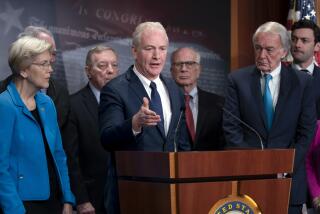Dole Backs Pact; Move Irks Bush Aides
- Share via
WASHINGTON — With President Reagan at his side and a plaque depicting the White House suspended behind his head, Senate Minority Leader Bob Dole (R-Kan.) announced his support Thursday for the new medium-range missile treaty in a move that infuriated Vice President George Bush’s supporters.
Dole, who is locked in battle with Bush for the Republican presidential nomination, had been sharply criticized by the vice president for refusing to take a stand on the accord signed last week by Reagan and Soviet leader Mikhail S. Gorbachev.
But in a carefully orchestrated appearance in the White House press room, Dole declared that “as the Republican leader, I will lead the fight for its approval in the Senate” and stressed several times that he, not Bush, will play “an active role” in the debate.
Reagan Proclaims Neutrality
Reagan, asked if he has been dragged into presidential politics, replied: “There’s nothing of that kind here. I am and have always been neutral with regard to the political race.”
However, a Bush adviser complained that Dole was acting out of “political necessity” after committing a “tactical mistake” by not immediately endorsing the pact.
The ceremony was seen by some political strategists as a deft coup for Dole a scant seven weeks before the Iowa caucuses. It underscored Dole’s influence as a Republican leader and put him in a presidential setting, while allowing him to seize a share of an issue that Bush was exploiting aggressively in his campaign.
Aides for both Dole and Bush agreed that Dole’s delay in backing the treaty over the past week was eroding support for the senator in Iowa, where the treaty is perceived to be popular.
Reagan’s decision to join Dole in the announcement--made as the President worked to rally support to win quick Senate ratification of the treaty--ignited tensions between the pro-Bush and pro-Dole factions in the White House staff.
Says Bush Missed Discussion
A senior White House official, speaking on the condition of anonymity, said the decision to invite Dole to the White House was made by Reagan at a meeting Tuesday that Bush normally attends. But he was 15 minutes late and missed most of the discussion, the official said.
In the aftermath, the White House official said, Bush assistants accused Reagan’s aides of setting up the Dole meeting “sneakily” and of “getting right in the middle of the presidential campaign and giving Dole a leg up.”
The vice president, this source said, was “not necessarily pleased.”
Rich Bond, a key Bush political aide who is running the vice president’s campaign in Iowa, and other Bush aides insisted that White House Chief of Staff Howard H. Baker Jr., Dole’s predecessor as Senate Republican leader, engineered the Dole visit.
‘Total Political Expediency’
“I think Bob Dole has made a move of total political expediency.” Bond said. “It has nothing to do with good government. It has nothing to do with his sentiments” on the treaty, which would eliminate the U.S. and Soviet arsenals of medium-range missiles. “He is beginning to get into a world of hurt, and he’s looking for a way out.”
Steve Roberts, Dole’s Iowa campaign chairman, said last weekend after Bush got a private visit with Gorbachev at the Soviet Embassy during the treaty summit: “I think there is some danger in Dole delaying an endorsement of the treaty. Politics shouldn’t always drive policy, but it would be helpful, at least in Iowa, to get the matter resolved.”
Dole’s sensitivity on the subject was reflected last week when he responded to a reporter’s question about the political mileage Bush was making out of the treaty by asking whether it referred to Bush “being endorsed by Gorbachev.”
At the White House on Thursday, Dole said he decided to support the treaty after conferring with his foreign policy advisers, as well as with Prime Minister Margaret Thatcher of Britain, Chancellor Helmut Kohl of West Germany, Prime Minister Giovanni Goria of Italy, Secretary of State George P. Shultz and Adm. William J. Crowe Jr., chairman of the Joint Chiefs of Staff.
Bush’s Reasoning Questioned
After listing the studies he conducted before deciding whether to endorse the treaty, Dole indicated Bush’s support was less reasoned, saying: “I don’t think it’s criticism, but the vice president was for it when the President was for it. That’s the way the system works.”
And his support will mean more than Bush’s, Dole stressed. “I don’t want to get into a Bob Dole-George Bush thing, but we just have different roles,” he said. “Mine is an active role--mine, as the (Republican) leader of the Senate. He doesn’t even vote on the treaty.”
Dole’s announcement followed a morning of groundwork for the Administration’s drive to win Senate approval of the agreement.
Shultz visited the Capitol, conferring with three committee chairmen who will hold hearings on the pact early next year.
Staff writers Rudy Abramson in Washington and John Balzar in Los Angeles contributed to this story.
More to Read
Sign up for Essential California
The most important California stories and recommendations in your inbox every morning.
You may occasionally receive promotional content from the Los Angeles Times.













